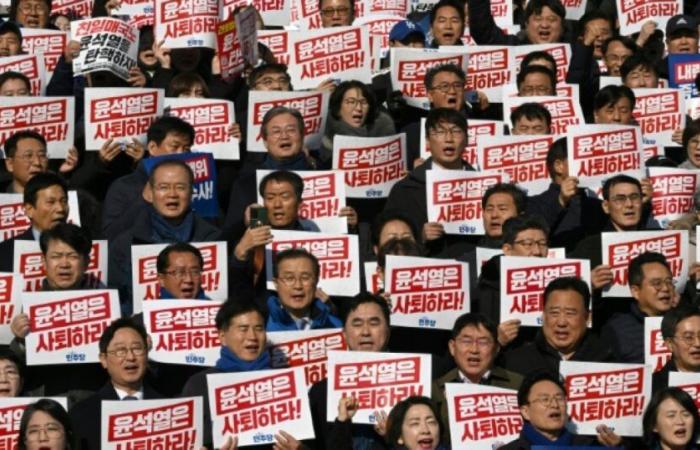Six South Korean opposition parties accused the country's President Yoon Suk Yeol of having “severely and extensively violated the constitution” in order to “avoid criminal prosecution” against him, in an impeachment motion filed Wednesday in Parliament.
South Korea experienced a day of anger and protests on Wednesday after a night of chaos on Tuesday, when President Yoon attempted to impose martial law for the first time in four decades.
The future of Mr. Yoon, a former attorney general who became president in 2022, is now uncertain.
The impeachment motion, which will require a two-thirds majority to be adopted, could be put to a vote as early as Friday, indicated the six opposition parties represented in Parliament, including the main one, the Democratic Party (center -LEFT).
On Wednesday, thousands of South Koreans demonstrated in the streets of Seoul also to demand the impeachment of Mr. Yoon.
With banners, candles and the distribution of hot drinks, Koreans showed that they were deeply shocked to have seen their country so close to turning its back on nearly 40 years of democracy.
“We have to defend her,” says Shin So-yeon, a young woman in her early twenties. “There is no other possibility.”
“It was like a history lesson,” said Park Su-hyung, 39. “Our democracy will be trampled if we leave Mr. Yoon in power for another moment,” he said.
“I had to be here tonight, the president is crazy,” said Choi Moon Jung, 55, as he handed out hot drinks.
Mr. Yoon, whose popularity rating was already at an all-time low, has his back against the wall by both the opposition and his own party after introducing martial law during a surprise speech late Tuesday, before repealing the measure a few hours later under pressure from deputies and the street.
In the context of difficulties in adopting the 2025 budget, the president justified this coup by saying he wanted to “eliminate elements hostile to the State” and “protect liberal South Korea from the threats posed by North Korean communist forces “.
Mr. Yoon, narrowly elected in 2022 and who has never had a majority in Parliament, had pointed to a “legislative dictatorship” and accused the elected representatives of the opposition of blocking “all budgets essential to the primary functions of the nation.”
– Soldiers in Parliament –
After his announcement, troops were deployed and army helicopters landed on the roof of the South Korean parliament. But 190 deputies out of 300 were able to meet in disaster in the hemicycle where special forces were trying to penetrate. They managed to pass a resolution and obtained the repeal of the measure just hours after its announcement.
The imposition of martial law involved the suspension of political life, the closure of parliament and the placing under control of the media.
Defense Minister Kim Yong-hyun announced that he had offered his resignation to the president. “I deeply regret and take full responsibility for the confusion and concern caused to the public by martial law,” he wrote in a statement.
Even Mr. Yoon's party, the People Power Party, distanced itself from the president's initiative.
The Korean Confederation of Trade Unions, the country's largest inter-union association with some 1.2 million members, called for an “indefinite general strike” until Mr. Yoon's resignation, saying he had “signed his own end in power.”
– Yoon “went crazy” –
At the start of Wednesday evening, the head of state had still not reappeared in public.
In front of the building, demonstrators shouted: “Stop Yoon Suk Yeol!”, noted AFP journalists.
The demonstration which had headed in front of the Presidential Palace dispersed smoothly in the middle of the evening, AFP photographers noted.
Martial law was last activated in 1980 in South Korea, when hundreds of thousands of people took to the streets to protest a military coup. These demonstrations were bloodily repressed.
Undermined by the events of the night, the Seoul Stock Exchange ended Wednesday down 1.4%.
The lifting of martial law shows South Korea's “commitment” to the rule of law, NATO Secretary General Mark Rutte welcomed on Tuesday, while the European Union reaffirmed its strategic partnership with Seoul.
China has “taken note” of South Korea's declaration of martial law, now lifted, but “will not comment” on the country's internal affairs.






